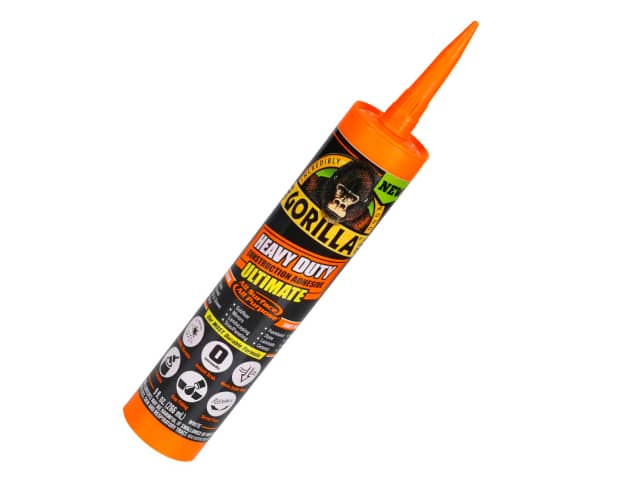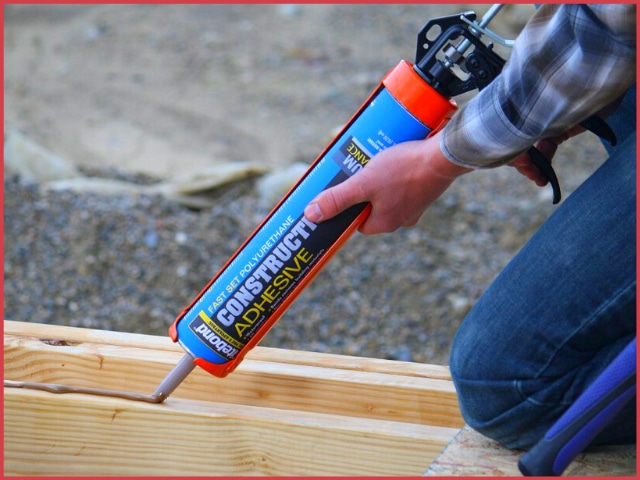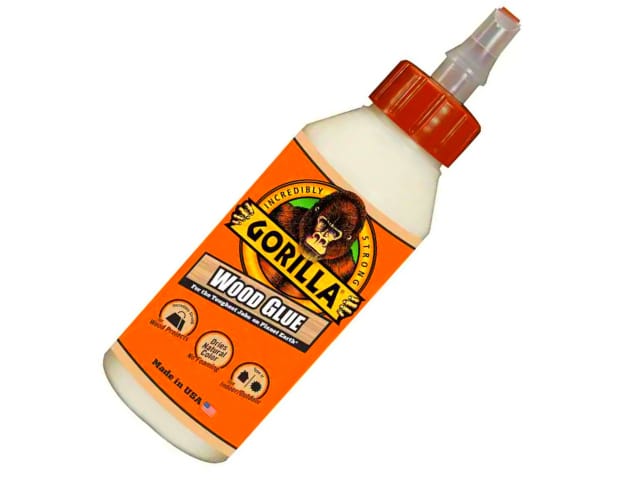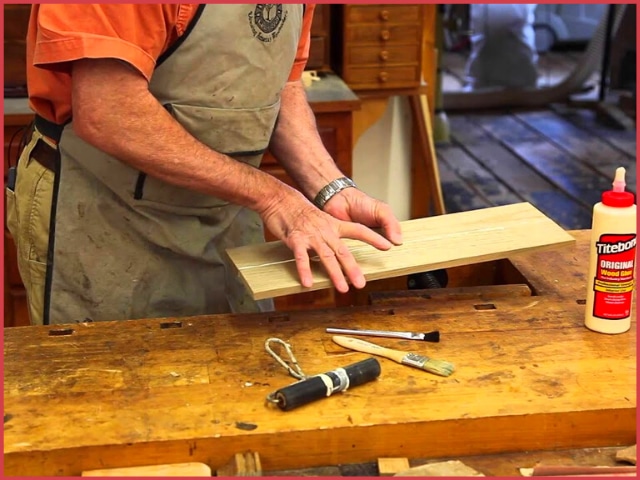Construction adhesive and wood glue are essential tools in any woodworker’s toolkit, but which should you choose when bonding wood?
You need to consider many factors before making your decision, including the material, the type of project, how much time you have to work on it, and so on.
Here are some guidelines on construction adhesive vs. wood glue to help you decide which one to use in each situation.
Read More: Best Adhesive For Brick
Construction Adhesive vs. Wood Glue
Construction Adhesive

Construction adhesive is a product that is used to bond two surfaces together. There are many types of construction adhesive. It is typically used to bond wood, metal, and glass in construction applications. It can be applied to both interior and exterior surfaces.
Construction adhesive is available in various formulations, including water-based, solvent-based, and aerosol-based. Construction adhesive is typically sold in tubes or cartridges that can be applied with a caulk gun.
Read More: Tile Adhesive vs. Thinset Mortar
Pros & Cons of Construction Adhesive
Construction adhesive can help fix some minor construction issues in your home, such as things that are cracked or warped, but it doesn’t adhere to concrete very well and isn’t ideal for larger jobs like building an addition.
Pros:
1. Construction adhesive is extremely versatile and can be used on various surfaces.
2. It creates a strong bond that can hold up against heavyweights and stress.
3. Construction adhesive is waterproof, ideal for use in wet or humid environments.
4. It is resistant to temperature changes and will not become brittle in cold weather.
5. Construction adhesive can be used on both porous and non-porous surfaces.
6. It is easy to apply and spread evenly with a putty knife.
7. Construction adhesive dries quickly, so there is no need to wait for it to set.
8. It is available in various formulas, so you can choose the one that best suits your needs.
9. Construction adhesive is relatively inexpensive and can be found at most home improvement stores.
10. It can be removed from surfaces if necessary, making it a forgiving material.
Read More: CA Glue vs. Wood Glue

Cons:
1. One of the biggest cons of construction adhesive is that it can be difficult to remove once it dries. This can be a serious problem if you need to make repairs or alterations to your construction project.
2. Construction adhesive can also be messy to work with. It can be challenging to apply evenly and can easily create a mess.
3. Construction adhesive is also relatively expensive. This can add to the overall cost of your construction project.
4. Finally, construction adhesive can have a strong odor that some people find unpleasant.
Read More: Subfloor Adhesive vs. Construction Adhesive
Wood Glue
Wood glue is an adhesive used to permanently bond pieces of wood together. It is typically made from a resin or polymer and water and can be purchased in liquid or gel form.
It is used to join two pieces of wood together. It is a strong adhesive that dries clear and is waterproof.
Wood glue is also used for papercraft, tabletop gaming, and model making. It is safe to use and non-toxic. It is an essential tool for woodworkers of all levels.

Pros & Cons of Wood Glue
There are three types of wood glue on the market, each with its own benefits and drawbacks. It’s important to know what those are before deciding which one to purchase for your project!
Pros:
1. Wood glue is incredibly strong and can hold together different pieces of wood securely.
2. They are also very versatile and can be used on different types of wood, including hardwoods and softwoods.
3. Wood glue is relatively easy to use and can be applied quickly and easily.
4. Relatively inexpensive.
Read More: How To Remove Construction Adhesive From Concrete?
Cons:
1. Wood glue can be challenging to remove once applied.
2. It is also not always completely waterproof, which means it can be susceptible to damage from moisture.
3. Wood glue can also be toxic if inhaled, so it is important to use it in a well-ventilated area.

My Verdict on Construction Adhesive vs. Wood Glue
Choosing between epoxy or construction adhesive or wood glue can be difficult because they both serve similar purposes in woodworking projects.
To know which to use in your next project, you first need to understand how they differ from one another.
Read on for more information on their uses, characteristics, advantages and disadvantages to make a better decision next time you’re at a store looking for some help with your next woodworking project!
Should You Choose Both?
You’re not going to need wood glue when you use construction adhesive and vice versa. They each have their own strengths, so pros often use them together.
Do some research and think through what projects you can try out with each of them separately, and then experiment with ways to bring them together to produce a better result than either could on its own!
Can You Use Construction Adhesive on Wood?
The biggest difference between construction adhesive and wood glue is that adhesives usually dry faster—meaning you’ll get better hold-time while still being able to make adjustments if needed.
What is Construction Adhesive Used for?
It is used to attach wood and plastic trim pieces to walls, ceilings, shelves, counters, etc. It is also used in construction projects, such as hanging pictures on walls.
What Can I Use Instead of Wood Glue?
Tape, Caulk, Hot glue, Superglue, Zip ties, Duct tape.
Can I Use Gorilla Glue Instead of Wood Glue?
Last Opinion
Concrete glue and wood glue are both excellent products in their own right, each offering distinct advantages that are useful for various applications.
But when it comes to your project, you’ll have to determine which one will serve you best based on several factors, including what material you’re trying to bond and what type of work surface your project will be placed on.

